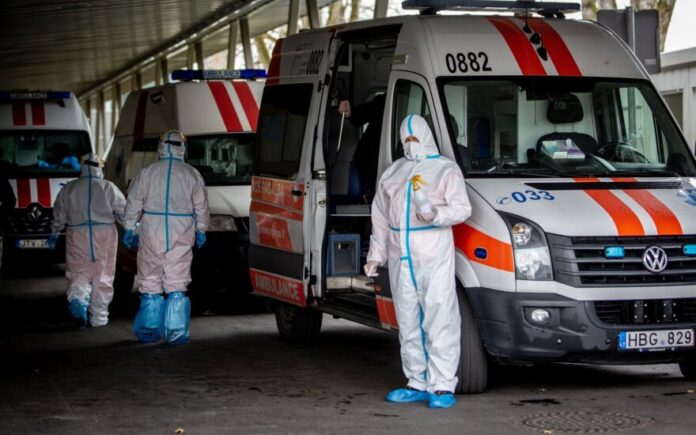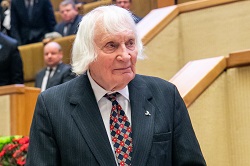
COVID-19 Update
As of December 11, Lithuania recorded 3,067 new coronavirus cases and 29 deaths over the previous 24 hours. Over that time, 12,059 people were tested, and 1,117 people were confirmed to have recovered from the disease. A total of 86,949 people have tested positive for the coronavirus in Lithuania so far. Some 49,628 people are still ill with the virus and 36,168 have recovered.
Changes in Kaliningrad Border
On December 8, Lithuania’s State Border Guard Service announced that the border guard zone along part of Lithuania’s border with the Russian region of Kaliningrad will be eliminated as of 2021. The guard zone will be eliminated near the border along the Rivers Nemūnas, Širvinta and Šešupė and also along the land border where CCTV is installed. The guard zone will remain along about 10% of the border with Kaliningrad.
The guard zone will remain near some bridges or viaducts on the Lithuanian-Russian border where the risk of crimes remains high, and also in border waters where border surveillance is more difficult, for example, on the Lake Vištytis. Natural persons and business representative wishing to enter border guard zones need to submit applications and additional documents to border guards, with processing taking up to ten working days.
Border protection has been enhanced by the installation of modern surveillance systems and other technical and organizational measures.
Freedom Prize for Belarusian Democrats
On December 8, Belarus’ democratic opposition was nominated for the Freedom Prize in Lithuania by the Freedom Prize Commission. The commission’s decision was meant to encourage the Belarusian people to continue its fight for freedom, as well as the memory of the 1990-1991 events in Lithuania, when Lithuanians needed signs of recognition from the international community.

Worth 5,000 euros, the Freedom Prize was established on September 15, 2011 and is awarded annually on the Day of the Freedom Defenders on January 13. Established by the Seimas of Lithuania, the Freedom Prize honours individuals and organizations for their achievements in and contribution to the defense of human rights, development of democracy, and promotion of international cooperation for the cause of self-determination and sovereignty of nations in Eastern and Central Europe.

Former awardees were Antanas Terleckas, political prisoner and founder of the political organization Lithuanian Freedom League; Archbishop Sigitas Tamkevicius, founder and editor of the underground Chronicle of the Catholic Church in Lithuania; Adam Michnik, a Polish dissident and editor-in-chief of the daily Gazeta Wyborcza, former Lithuanian President Valdas Adamkus, Lithuania’s first post-independence leader and chairman of the Supreme Council-Reconstituent Seimas, dissident nun Nijolė Sadūnaitė, as well as seven partisans who fought against Soviet occupation. Last year, the award went to Albinas Kentra, chronicler of Lithuanian history, member of the Lithuanian resistance and prisoner of the Soviet Gulag.
Cyber Attack on Lithuania
A coordinated and complex cyber-information attack was carried out against Lithuanian institutions on Wednesday night (December 9), according to the Foreign Ministry. The website of the State Border Guard Service (VSAT) was hacked to publish a false statement, alleging that a Polish diplomat had been detained on the border carrying weapons, drugs, and money.
The Foreign Ministry said it recently observed an increase in attacks aimed at undermining friendly Lithuanian-Polish relations and pitting the two nations against one other.
The website of Šiauliai Municipality, in northern Lithuania, was also hacked on Wednesday night to post a fake article about the airport housing NATO’s Baltic air policing mission.
Additionally, false notifications with instructions to report to the regional military conscription and recruitment units were sent out to institutions and individuals in Lithuania.
Several Lithuanian institutions came under different, but coordinated attacks, according to Rytis Rainys from the National Cyber Security Centre, which is part of the country’s Defence Ministry.
In September, the Foreign Ministry warned about false information, published in its name, which claimed that Foreign Minister Linas Linkevičius had called for sending peacekeeping forces to Belarus. Among other incidents, a falsified email from NATO Secretary General Jens Stoltenberg was sent to institutions in Lithuania and Brussels, claiming that NATO troops would be withdrawn from the country.
Power Struggles
Since the collapse of the Soviet Union, Estonia, Latvia, and Lithuania have continued sharing the same Russian-controlled power grid with Belarus. By 2025, the three Baltic states plan to switch to a European network. Meanwhile, Lithuania has blocked electricity trade with Belarus after it launched its nuclear plant in Astravyets on November 3 due to safety concerns.
On December 11, EU leaders backed Lithuania in its call on the European Commission to ban electricity imports from the Belarusian nuclear plant. At Lithuania’s initiative, a statement was issued by the European Council summit on December 10-11 in Brussels, underlining the importance of ensuring nuclear safety of the Belarusian nuclear power plant. The EU leaders called on the Commission, the European Union’s executive body, to investigate possible measures to prevent commercial electricity imports from third countries’ nuclear facilities that do not fulfill EU recognized safety levels.

Lithuania has been seeking an EU-wide ban of electricity produced at Astravyets NPP, which is located some 50 kilometres from Vilnius. Lithuania is the only EU nation with an electricity link with Belarus, as together with Estonia and Latvia, the country shares a common energy grid with Belarus and Russia. Although the Baltic states have signed a political agreement that seeks to bar commercial access to electricity produced at Astravyets, Lithuania’s energy regulator, National Energy Regulatory Council (VERT), has refused to back it, saying there are no technical means to implement the ban.
Latvia has now increased energy trade with Russia, with critics in Lithuania protesting that this opens a way for Belarusian electricity to enter the joint Baltic energy market via Moscow. Lithuania has been one of the most ardent critics of the nuclear plant built by Russia’s state atomic corporation Rosatom and funded by a loan from the Kremlin. Vilnius says the plant is unsafe and was built in breach of international safety standards. Minsk denies all allegations.
With news from LRT.lt, URM.lt






























